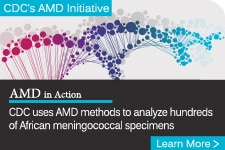Laboratory Information
CDC’s Bacterial Meningitis Laboratory works primarily on two pathogens: Neisseria meningitidis and Haemophilus influenzae. If you would like to find laboratory information about Streptococcus pneumoniae, please see the Streptococcus Laboratory site.
Overview
CDC’s Bacterial Meningitis Laboratory supports:
- Active, population-based surveillance for N. meningitidis and H. influenzae in an overall population base of more than 44 million people
- Enhanced meningococcal disease surveillance in all 50 states and 3 large jurisdictions
- State and local health department laboratories that request assistance
- Outbreak investigations
- Specialized research projects related to N. meningitidis and H. influenzae
Laboratory surveillance data play a critical role in continuing efforts to combat bacterial meningitis pathogens in the United States. Laboratory data and isolates collected through surveillance programs, including Active Bacterial Core surveillance, serve as a valuable resource for researchers.
International capacity building
CDC’s Bacterial Meningitis Laboratory is also very active in laboratory capacity building and quality control internationally. It serves as a World Health Organization Collaborating Center for Meningitis. The lab is a well-recognized reference center for identification and characterization of N. meningitidis and H. influenzae.
Specialized research projects
In addition to surveillance and reference activities, the lab is actively involved with specialized research projects with public health relevance.
Best practices for use of polymerase chain reaction (PCR) for diagnosing Haemophilus influenzae and Neisseria meningitidis disease and public health importance of identifying serotype/serogroup
Reference lab
CDC’s Bacterial Meningitis Laboratory can offer advice concerning laboratory procedures dealing with N. meningitidis and H. influenzae isolates. The lab can also assist in characterizing bacterial meningitis isolates that have novel features with potential public health impact. Report suspected outbreaks to state or local health departments.
Unfortunately, the lab does not have the resources to perform serogrouping/serotyping or other molecular characterization for all requests it receives. Therefore, requestors are required to discuss with the lab, in advance, the reason for any request. This allows allocation of resources to type those isolates that will answer the most pressing public health questions. An outbreak is one example of a situation in which rapid serogrouping/serotyping and molecular typing has immediate value.
If you have any questions, please feel free to contact us by email at meningnet@cdc.gov.
